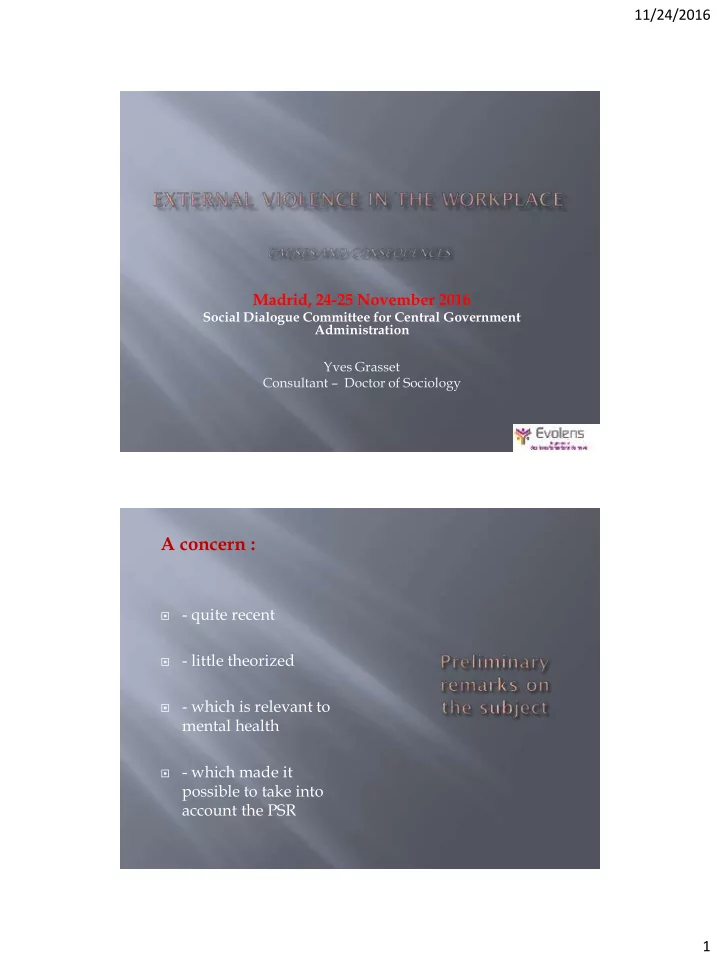

11/24/2016 Madrid, 24-25 November 2016 Social Dialogue Committee for Central Government Administration Yves Grasset Consultant – Doctor of Sociology A concern : - quite recent - little theorized - which is relevant to mental health - which made it possible to take into account the PSR 1
11/24/2016 - for the employee : health, psychological balance, self- esteem, sense of work, confidence, … - for the team : recognition of tensions, induced adjustments, cooperation, loss of confidence, ... - for the organisation (entreprise, administration) : Image of provided service, media, degraded output, absences, refusals and avoidances, right of withdrawal, strikes, ... ... Violence : both a personal and collective experience A prerequisite: knowing how to differentiate conflict and violence Physical aggression Threat Insult, intimidation, revenge Emotional blackmail (threat of suicide in case of refusal) Attempted racketeering Theft or degradation of equipment ... affecting one or more public employees in the performance or in connection with their duties 2
11/24/2016 Services and relational occupations Face to face client / user / offender / patient / resident Differential exposure to violence due to activity: - is part of the job (public order, control) - is a risk inherent in the job (banking, trade, caregivers) - is a risk incurred (local healthcare insurance/CPAM , social permanence) ... determining role of occupational standards and work collectives 60 Controller at the Post 50 office Bank employee 40 Security Agent 30 Social Worker 20 Bank Executives 10 Hostess 0 Assaulted Seller over the last 12 Worker at the post months office 3
11/24/2016 35 30 25 20 Série 1 Série 2 15 Série 3 10 5 0 FPH FPT FPE Transp.Other serv Bat. ind. agri F H Ens • From Incivility to Violence Physical Integrity Moral Integrity Competences Institution Situation 4
11/24/2016 Nervousness, annoyance, guilt Hyper-vigilance Irrational behaviors: trivialisation or dramatisation “P ostponed" anger High expectations regarding the institution Loss of confidence in the hierarchy Doubts about the relevance of the rules Feelings of isolation Heavy or even noxious atmosphere in the team Rejection of others, amalgams, racism Sorting in the users category (Loriol) Return to prescription, relational disengagement Wild adaptation of occupational rules Anxiety, demotivation, loss of self-confidence, devaluation, fatigue 5
11/24/2016 Desertion and avoidance by the public (anxiogenic places) Recruitment difficulties Request for material recognition of the risk Inaudible organisational projects (development /insecurity) Contradiction btw advertising and public image Negative Collective image : refusal to say where I work Implementation of the right of withdrawal Strike threat – Strike External call (public authorities, media, ...) Doubt about the institution: demand for "ever more“ Desertion and/or avoidance, request for transfer, resignation 6
11/24/2016 Responsiveness and follow-up required Incarnation is essential Caution with the approach based on numbers, measures Caution to the “postponed" prescription which is paradoxical or even impossible to apply Violence does not impact only people who seem to have been directly victimized Who does what when incident? (Management, direction, health and safety committee) Care (defusing, debriefing,) Complaint (conditions, accompaniment) Early internal and external communication Maintaining contact when leave (who, how) The re-induction Training Preventive measures … 7
11/24/2016 Disengaging invariants; Working on regularities Supporting collectives (very effective, but generates fears) Formalising and committing : prescription is imperative in a degraded situation Articulating levels of prevention: towards the primary as soon as the emergency is correctly treated (if not, risk to be inaudible) Rehabilitating and/or reinforcing management Making together (collegiality, coalition, collective, co- construction ...) Recreating a "protective cover”: a multifaceted approach that starts from the top www.evolens-conseil.fr 8
Recommend
More recommend